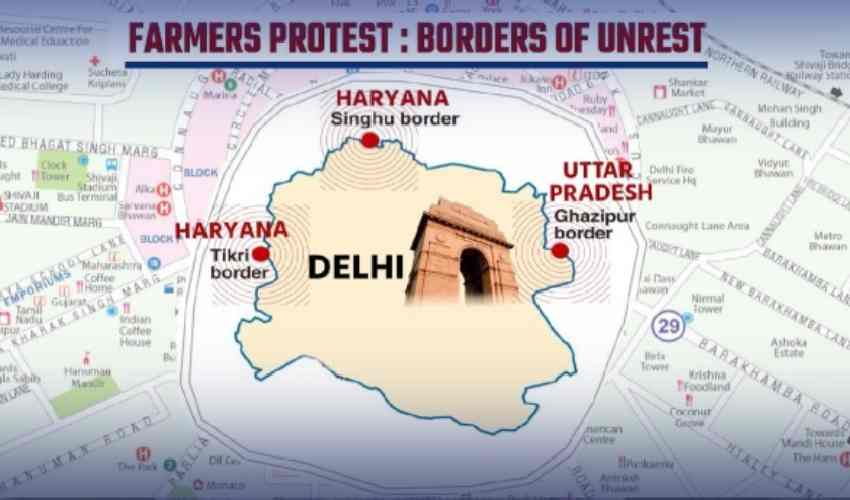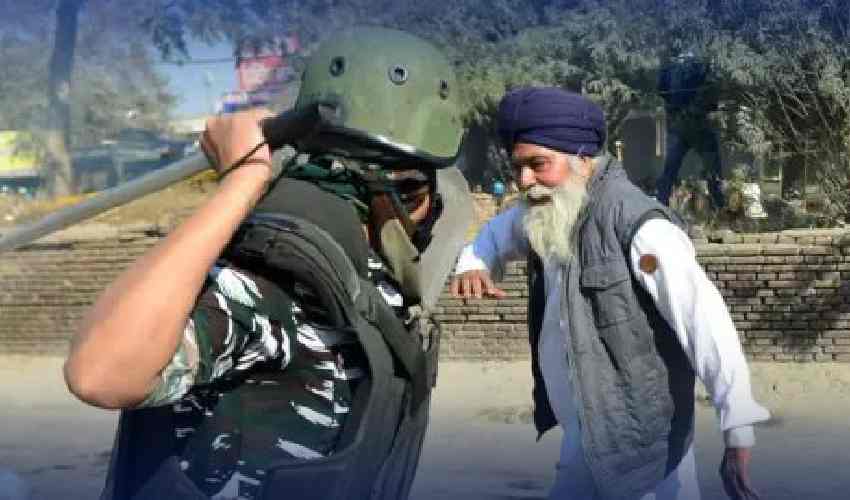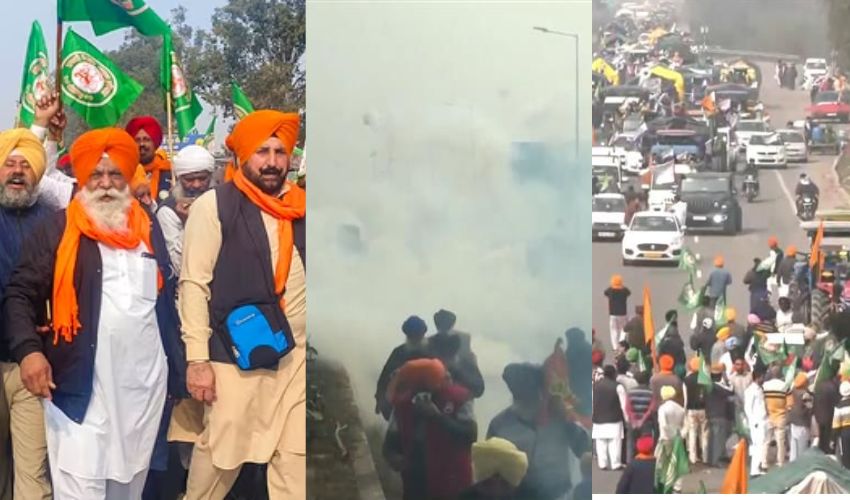Hundreds of thousands of farmers marching towards New Delhi—for the long haul—carrying enough ration and diesel to last for months, as the borders have been sealed to prevent them from entering India’s capital.
The farmers began their march this morning from Fatehgarh Sahib after late-night talks with a government delegation in Chandigarh failed.
Delhi has been fortified to stop the farmers from entering the city, with key border points - Ghazipur, Tikri, and Singhu - barricaded. A month-long Section 144 has been imposed in Delhi.
The march, the latest in a series of such protests going back more than two years, comes months ahead of national elections in which Prime Minister Narendra Modi will seek a third term, with farmers forming an influential voting bloc.
An Indian news magazine said Tuesday that the government had ordered it to delete an online report that implicated soldiers in the torture and killing of civilians in disputed Kashmir.
Rights groups say that restrictions on the press are increasingly common in India and particularly onerous in Kashmir, a restive Himalayan region where India has more than half a million troops permanently stationed.
The Caravan, a news and current affairs monthly, last week published a lengthy report on the deaths of three civilians detained by the army in December after a deadly insurgent attack on troops.
The magazine said Tuesday that the information ministry had sent it an official order demanding the story be taken down within 24 hours.
"The order's content is confidential," the magazine said in a post on X, formerly Twitter. "We will be challenging this order."
Caravan did not respond to AFP's request for comment. The information ministry declined to comment.
The three men killed were part of a group rounded up by security forces in the aftermath of the December insurgent attack, which left three Indian troops dead.
India's army promised an inquiry into the detentions after news of the deaths became public, while others who were taken into custody said they were tortured.
Their accounts were corroborated by footage of some detainees being physically abused by security forces that was leaked and shared widely on social media soon afterwards.
Kashmir has been divided between India and Pakistan since independence, with both countries claiming it in full.
Tens of thousands of soldiers, rebels and civilians have been killed since the outbreak of an insurgency against Indian rule in 1989.
India blames Pakistan for backing the militants, a charge Islamabad denies, saying it only supports a Kashmiri struggle for the right to self-determination.
Official takedown orders compelling the removal of critical reporting and opinion have become an increasingly common tool of Modi's government.
The order against Caravan was "reflective of the increasing censorship that is being imposed on speech on the internet in India", Prateek Waghre of the Internet Freedom Foundation, a local digital rights group, told AFP.
"We're seeing more instances of such action for reporting that is inconvenient for the government," he added.
India has fallen 21 spots to 161 out of 180 countries in the World Press Freedom Index, compiled by Reporters Without Borders, since Modi took office in 2014.
What are Indian farmers’ demands?
The farmers are protesting over a series of demands, including a minimum support price (MSP) for their crops.
- Full debt waiver for farmers and labourers
- Implementation of the Land Acquisition Act of 2013, with provisions for written consent from farmers before acquisition, and compensation at four times the collector rate
- Punishment for the perpetrators of the October 2021 Lakhimpur Kheri killings;
- Withdrawal from World Trade Organization (WTO) and freeze all free trade agreements;
- Pensions for farmers and farm labourers;
- Compensation for farmers who died during the Delhi protest, including a job for one family member;
- Scrapping of Electricity Amendment Bill 2020
- 200 (instead of 100) days’ employment under MGNREGA per year, daily wage of Rs 700, and scheme should be linked with farming
Kissan Protest 2.0
Strict penalties and fines on companies producing fake seeds, pesticides, fertilisers; improvements in seed quality;
National commission for spices such as chili and turmeric
The 2024 farmers protest is the follow-up to their 2020 protest in which they had camped at the border points for 13 months.
As per NDTV, Harbhajan Singh, a farmer from Punjab's Gurdaspur, headed to Delhi on his tractor, pulling two trollies loaded with supplies said, "From a needle to hammer, we have everything we need in our trolleys, including tools to break stones. We left our village with six months' ration with us. We have enough diesel, even for our brothers from Haryana.”
BJP's police are using highhandedness to deter farmers at the Haryana border...
— Dr Ranjan (@AAPforNewIndia) February 13, 2024
This will only strengthen their resolve to fight against the BJP Central Government.#FarmersProtest2024 #FarmersProtest #DelhiChalo pic.twitter.com/1H0KCdKFEy
New Delhi Borders sealed
To fortify the border areas, multiple layers of barricades have been set up, featuring wires, nails, and substantial concrete blocks and containers, all strategically placed along the entry points to the national capital.

Meetings failed with farmers
Indian media reported that on Monday, three Union Ministers, Arjun Munda and Piyush Goyal met with the farmers to discuss their situation, however, the latter were dissatisfied and decided to go ahead with the march.
"We tried our best during the meeting yesterday to resolve the issue and avoid a clash with the (central) government. We attended the meeting for five hours," Pandher added, speaking about the meeting.
The Police fire tear gas on farmers protesting against BJP govt
— Amock (@Politics_2022_) February 13, 2024
Are you watching this cruelty Jayant Chaudhary?#FarmersProtest2024#KisanAndolanpic.twitter.com/XqYw4GmzCS
Are they same groups that protested in 2020?
No, the Samyukta Kisan Morcha (non-political) is a breakaway faction of the Samyukta Kisan Morcha (SKM). Jagjit Singh Dallewal, president of the Punjab-based Bharatiya Kisan Union (BKU) Sidhupur farm union, is the leader.
KMM was also not part of the main protest in 2020. It is led by Sarwan Singh Pandher, convener of the Punjab-based union Kisan Mazdoor Sangharsh Committee (KMSC).
AAP govt stands with farmers; Haryana police fire tear gas at Shambhu border
Kisan Mazdoor Morcha coordinator Sarwan Singh Pandher said it is now the turn of the Haryana farmers to take the protest forward.
In a video message, Pandher said the protesters do not want any clash with the authorities.
#WATCH | Police use tear gas drones at the Haryana-Punjab Shambhu border to disperse protesting farmers. pic.twitter.com/LcyGpDuFbv
— ANI (@ANI) February 13, 2024
Context
- In 2020, farmers protested against three farm laws; these laws were repealed by the central government in 2021.
- The Delhi Chalo protest is underway, demanding legal guarantees for Minimum Support Price (MSP), full debt waiver for farmers, pension, Swaminathan Commission's formula implementation, and withdrawal of cases against 2020 protesters.
- The 2020 protests were led by Bhartiya Kisan Union and Samyukt Kisan Morcha; Delhi Chalo 2.0 is led by Samyukt Kisan Morcha (Non-Political) and Kisan Mazdoor Morcha.
- Prominent leaders of 2020 protests included Rakesh Tikait and Gurnam Singh Charuni; Delhi Chalo 2.0 is spearheaded by Jagjit Singh Dallewal and Sarwan Singh Pandher.
- Government accepted 2020 demands to withdraw protest-related cases but didn't provide a legal MSP guarantee; negotiations for Delhi Chalo started before the protest, with meetings on February 8 and 12.
- In 2020, farmers entered Delhi; now, stringent measures like barbed wire, cement barricades, road nails, and Section 144 are implemented, restricting access.
- The Haryana government closed its borders with Punjab as a preventive measure for the Delhi Chalo 2.0 protest.
- The Delhi Chalo protest symbolizes continued farmer agitation despite the repeal of the contentious farm laws.
- Farmers' demands reflect ongoing concerns about agricultural policies, MSP assurance, and farmer welfare.
- The government faces pressure to address farmer grievances and find a resolution to the ongoing protest.
Viral Picture of 2020 farmers' protest
Many pictures and video songs became sensational hits during the Kissan Morcha and were widely shared on social media platforms.




























